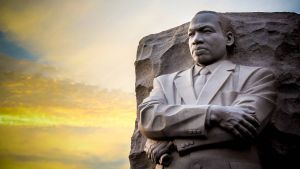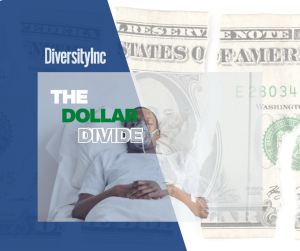Charisse Fontes’ journey of being unhoused began 10 years ago in California, which has a disproportionate Black homeless population.
After attempting to pursue a relationship that didn’t work out, the pregnant, Black mother of two children had nowhere to stay. Fontes went to the county for help and her “home” became motels and shelters.
Fontes vividly remembers the vouchers she received for motels in seedy areas. The shelter bathroom she was required to clean and share with a family of five. The mother with a teenage boy who was indifferent to cycling in and out of the shelter.
“You’re trying to function in normal society, but you’re not normal in any way,” she says. “A lot of your food is donated. A lot of your clothes are donated. Some people don’t necessarily share the same desire to get out as you do.”
Racial Disparities in Homelessness
Race and homelessness are often intertwined.
Over half a million people in the United States are homeless. Historically disadvantaged groups, including African Americans, Native Americans, Native Hawaiians and Pacific Islanders, experience homelessness at higher rates than whites.
“To truly address this crisis in our country, we must acknowledge the disparities that exist and the fact that people of color are disproportionately impacted by homelessness and housing insecurity,” says Stephanie Ledesma, Vice President of Community Health Programs for Kaiser Permanente (a Fair360, formerly DiversityInc Hall of Fame company).
While African Americans are 13% of the general population, they account for more than 40% of the unhoused population, with families making up a significant portion.
The reasons behind homelessness are multifaceted. Some people become homeless because of domestic violence or substance abuse issues. Lower incomes, less access to healthcare and higher unemployment and incarceration rates are among the factors contributing to higher rates of Black homelessness. The slowing economy, housing shortage and rising rents have worsened a bad situation.
A legacy of redlining and housing discrimination is also to blame, says Jennifer Friedenbach, Executive Director of the Coalition On Homelessness.
“African Americans have not had access to purchasing properties in areas where the real estate values have risen much higher,” she says. “They have not been able to accumulate wealth through that. Then there’s housing discrimination on the front end. People are seeking housing and landlords are discriminating against African Americans. Homelessness is where you see the visible effects of continued racist policies in the city and across the country.”
READ: The Role of Credit in the Black Homeownership Gap
Corporate Social Responsibility and Homelessness
Corporate social responsibility (CSR), which can address societal issues like homelessness, is a win-win for employers and employees.
Research from the MIT Sloan School of Management found that not only does CSR help attract talent and boost employee morale in the workplace, but it can also lead to greater productivity and profits. Fifty-eight percent of organizations with a strong and a clear sense of purpose experienced 10% or more growth during the last three years, according to a study sponsored by EY, a (Fair360, formerly DiversityInc Hall of Fame) company.
CSR has become a critical issue for workers, especially Millennials, the largest generation in the workforce. One study found that 83% of Millennials would be more loyal to a company that helps them contribute to social and environmental issues and 64% won’t take a job if their employee doesn’t have a strong CSR policy. Workers want to be involved in their company’s CSR initiatives and for its mission and values to align with their own. Companies are responding by encouraging volunteerism and some are paying workers for their time.
When viewing corporate philanthropy through this lens, it should come as no surprise that the percentage of total giving directed to community and economic development among the Fair360, formerly DiversityInc Top 50 Companies for Diversity has increased over the past three years.
Keith Brown, Director of Community Impact at Randstad (No. 21 on Fair360, formerly DiversityInc’s 2022 Top 50 companies for Diversity list) views social responsibility as a trifecta.
“How do we engage around creating profits so we have a quality product or service that we provide and we’re doing it through our skilling efforts?” he asks. “How do we create an opportunity to support our communities so we can mitigate your crime and create good citizenship and a neighborly perspective? Then how do we create an ecosystem to ensure that the environment supports all that we’re doing and that these communities are thriving?”
Tackling the complex issue of homelessness requires a coordinated approach beginning with communities and continuing with strategies like government and corporate involvement.
“One way is one-time funding towards the capital purchase of buildings and then trying to match that with ongoing government support,” says Friedenbach. “Another way is working with local organizations and hiring. Make sure they’re reaching out to employment organizations whose clients are Black and brown community members disparately impacted by poverty and homelessness and ensuring jobs within their companies.”
Homelessness often creates new health problems and exacerbates existing ones. Cleveland Clinic (No. 2) and Jefferson Health (No. 8 on Fair360, formerly DiversityInc’s 2022 Top Hospitals and Health Systems list) have launched initiatives that provide healthcare and social services to patients experiencing homelessness.
But despite the support of healthcare providers, no amount of healthcare can substitute for stable housing.
The National Low-Income Housing Coalition says almost 7 million more affordable housing units are needed nationwide for extremely low-income families. Corporate efforts can include partnering with local organizations or investing in affordable housing to improve outcomes for the homeless. That’s what companies like TD Bank (No. 13) and U.S. Bank (No. 17 on Fair360, formerly DiversityInc’s 2022 Top 50 companies for Diversity list) have done.
“It’s almost impossible to stabilize economically while you continue to live on the streets,” says Friedenbach. “It’s difficult to hold on to identification and it’s difficult to get enough sleep to be able to successfully compete in the job market.”
Corporate tax increases on businesses in California have also been cited as one way to help solve the homelessness crisis.
“Often, it’s left to the municipal governments who don’t have the existing tax base and have to pass measures to get revenue to pay for housing, treatment and other things that the federal government has neglected,” says Friedenbach. “A lot of the corporate community opposes those measures very vigorously and it makes it difficult to generate revenue through taxation. Companies need to rethink what it means to be a good corporate community member and support efforts that are moving toward ending homelessness.”
READ: Socially Conscious Profits Turn Steady Profits
Homeless Prevention Initiatives in Action
Kaiser Permanente says it’s in its DNA to invest in the health of the communities it serves. The nonprofit healthcare provider addresses homelessness by investing in affordable housing, strategic partnerships and shaping policy.
Kaiser Permanente has committed $400 million to the Thriving Communities impact investment fund, which will help create or preserve 30,000 affordable housing units by 2030. Since March 2022, the company has also contributed a total of $3.4 million to 21 crucial medical respite care programs to provide up to 15,000 individuals experiencing homelessness with a safe place to recover from illness.
“We want to support systems change through our investments and efforts in our communities,” says Ledesma. “We want to challenge assumptions within affordable housing and community development investing, contribute broadly to programs that provide for disruption and innovations and create attainable solutions to entrenched problems.”
Seven years ago, Randstad founded Hire Hope. The program provides career-readiness training and job-placement services for women who are victims of human trafficking, domestic violence and homelessness. Hire Hope is only available in the Atlanta area, but Randstad is expanding the effort to other markets.
“In the U.S. alone, racial minorities experience homelessness at a higher rate than the white population,” says Brown. “How do we engage racial minority populations so they can be skilled in a thoughtful, streamlined way that aligns with our client ecosystem? We will have a much more dynamic workforce that is loyal to our client ecosystem, as well as loyal to being great community and corporate citizens.”
READ: Advancing Health Equity Through Community Partnerships
From Homelessness to Housing
When Fontes was homeless, she was determined to improve her children’s lives.
After 500 employment applications and numerous bus trips from the shelter to interviews, she eventually secured a job and moved into transitional housing. After that, Fontes and her kids lived in a home donated by a local church for a year.
“When I was going through my journey, I didn’t focus on the fear,” she says. “I stayed focused on – this is the next step that I need to get to. Through that, opportunities opened up and I was able to navigate.”
Fontes is thankful for the private landlord that rented her an apartment, despite having poor credit. She benefited from WANDA, a program that taught her and other single mothers about financial literacy. WANDA is supported by sponsors and partners, including Capital One (No. 22 on Fair360, formerly DiversityInc’s 2022 Top 50 companies for Diversity list). The program connected her with a mentor who encouraged her to set goals.
Fontes survived homelessness and is now a business owner that helps companies evolve or transform their culture. She is married with six kids. While her husband was recently laid off, she believes her family’s better equipped to deal with economic uncertainty.
“I tried to pursue this entrepreneurial journey and it’s not as secure and there is a lot of risk with what I’m doing right now,” she says. “We worry a bit, but I have better tools to help me.”
Nevertheless, Fontes admits that the feeling of living on the edge of homelessness never leaves those who were once unhoused.
“Even though you get out of the situation you’re in, it’s the mindset you have to rewire,” says Fontes. “It’s that fear of, oh my gosh, if I lose my job or get laid off, I’m gonna go back into this system because our society isn’t set up unless you have a lot of reserves. It’s not set up to help people maintain levels of housing.”


















